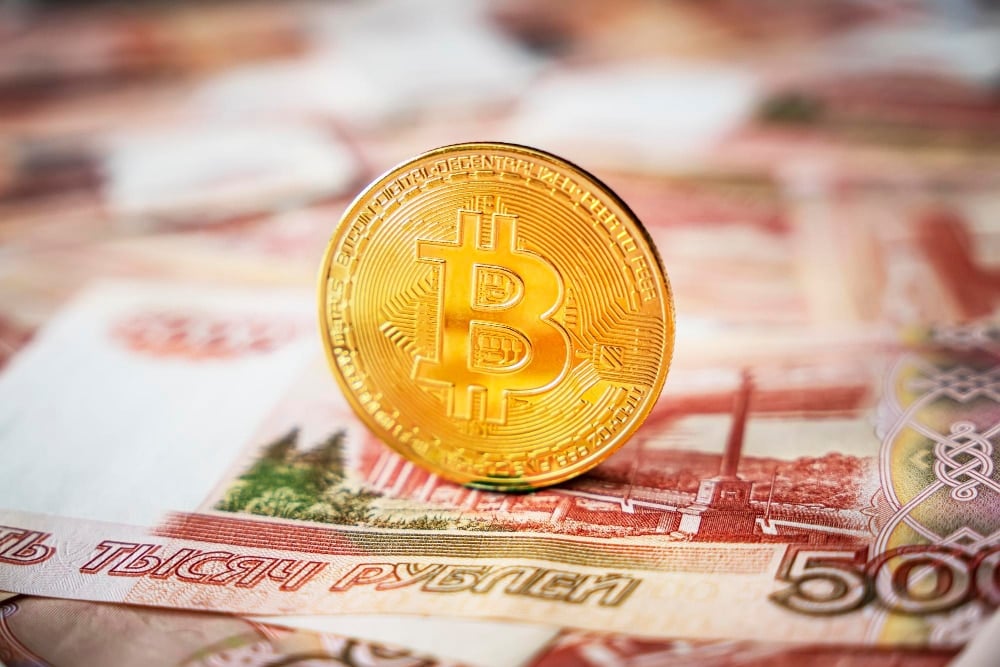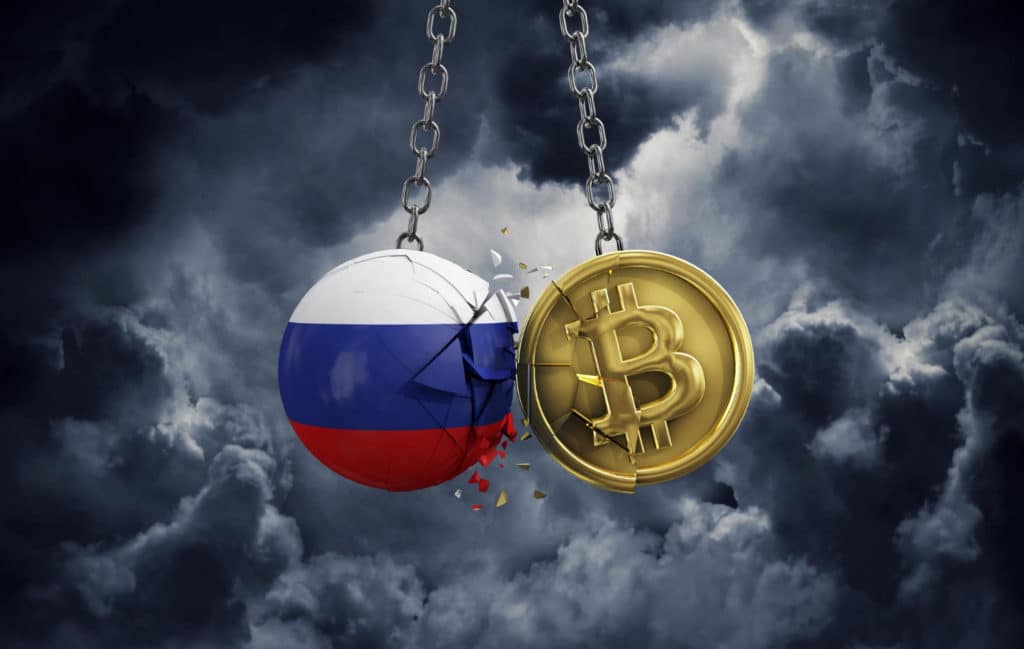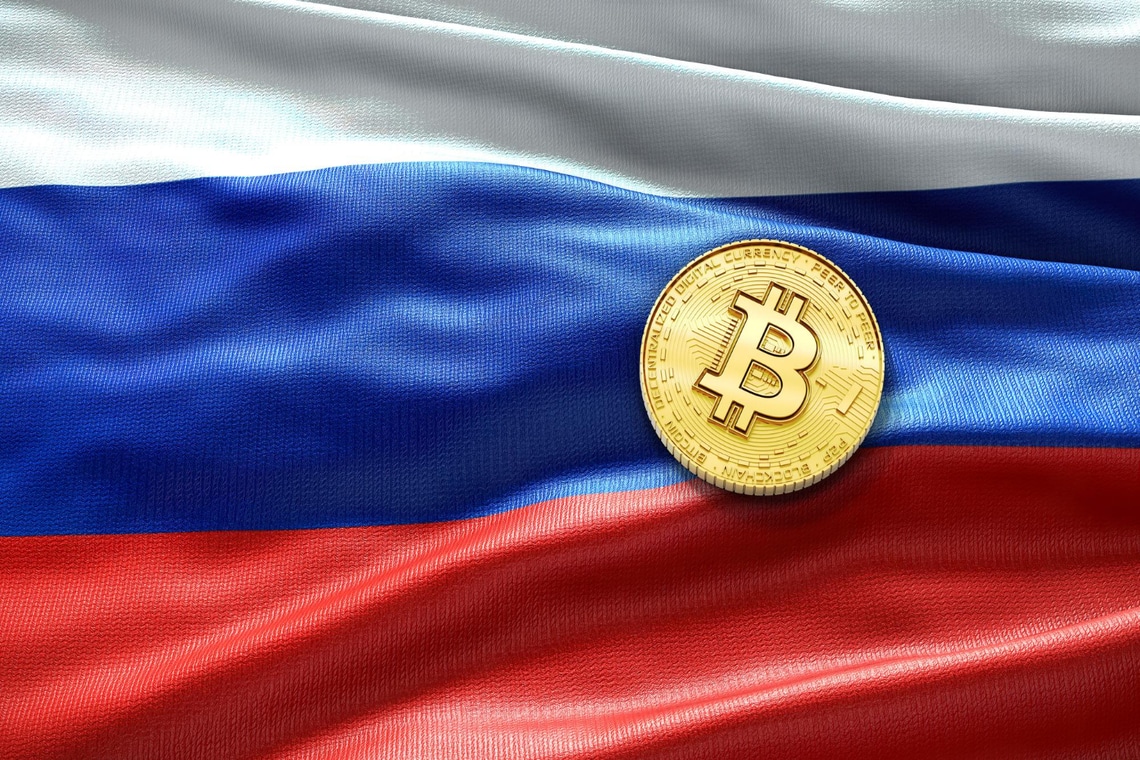Crypto payments for international trade are now a reality in Russia and it will be possible to trade using Bitcoin. This is being pushed not-so-subtly by the government itself, which believes this step is necessary for the circumvention of international sanctions placed on the country.
Summary
Russia decides to legalize crypto for international payments
The liaison between the Kremlin and Bitcoin goes back a long way, over time Vladimir Putin’s government (Bitcoin was born in 2008 when the President had already been at the helm of the country for 9 years) has often changed its opinion on whether or not this means of payment, the technology from which it is derived and other cryptocurrencies are useful, in particular it has often changed its opinion on whether or not this was useful for the country’s interests.
Over time it went from a position strongly opposed to Russia’s opening to this new world, to the opposite position, that is, the one still held by the Finance Minister in Moscow today, the viewpoint for or against digital currencies has alternated at least two more times, but sooner or later the gap had to be filled.
Such a legislative gap in such an important country with regard to geopolitics, and not only, had to be resolved by ad hoc legislation.
The combination of the war with Ukraine and the sanctions received from the international community as a result of this act, has led the world’s largest country to suffer a huge economic burden from the sanctions imposed by the Atlantic pact countries and many others around the world.
While some of the GDP has been recovered, as Moscow is among the world’s largest exporters of commodities such as gas and oil, and has made up for it by selling the missing quotas to China, much more needed to be done, and the propulsive thrust of virtual money has kicked off a process of studying Bitcoin and associates as an important aid to circumventing sanctions damage.
While waiting for a framework law to regulate cryptocurrencies in all their aspects and forms, the Duma at first had banned payment in digital currencies and the use of all those instruments that make it even partially possible.
“A set of electronic data contained in an information system that can be accepted as a means of payment that is not the monetary unit of the Russian Federation, or as an investment.”
This is how cryptocurrencies are defined in the text of the drafted legislation.
The momentary measure served to plug a legal loophole concerning precisely the transactions and nature of crypto in all their forms and variants and put a temporary halt to the asset’s growth in the territory. However, the Duma, the Soviet parliament, did not have time to pop the bottle and in meantime, a joint report between Russian intelligence services and the Ministry of Finance shuffled the cards on the table again.

The role of the Russian Central Bank in the legalization of crypto in the country
The Central Bank of Russia (CBR), will be in charge of registering all DFA operators as subjects of the Russian national payment system, and qualified investors will be able to operate freely, while those who do not get permission from the regulator will be able to operate, but only within certain amounts. They will not be able to make transactions exceeding 7,000 euros each (600,000 rubles).
Less than a month ago, the Minister of Industry and Trade, Denis Manturov, interviewed at a forum on the subject, had expressed a reassuring view on the issue.
Denis Manturov, Minister of Industry and Trade a month ago on the sidelines of a forum had said he was positive about Bitcoin and believed that cryptocurrencies in general would eventually become part of the country’s economy.
Moscow has for years been vigilantly watching this world and has even put in the pipeline the creation of the digital Ruble, devoting the last two years to this project.
In Putin’s plans is the creation of a full-fledged digital state currency that will be placed side by side with other crypto, but will have a dominant position compared to them.
The Digital Financial Assets (DFA) that had been stopped by the imposition of the Russian Federation and the lower house of parliament have passed the buck, and a broader and more specific framework law has replaced the current one.
The development of CBDC in Russia, the digital ruble
Russia will continue to fine-tune its CBDC, according to the latest statements by Russian Central Bank President Elvira Nabiullina, the so-called Digital Ruble will see the light of day no later than 2023.
The currency has been tested with simulations for quite some time and final technical details are being filed within the walls of the CBR in anticipation of the official launch next year.
“The question is, when this will happen, how will it be regulated, now that the central bank and the government are actively working on it but everyone tends to understand that … sooner or later this will be implemented, in one format or another.”
Moscow’s plan is to strengthen the fiat ruble and then launch and focus on the digital ruble. Only after these fundamental and pre-eminent steps for the country will digital currencies be liberalized.
The TASS news agency pointed out that according to the Russian government “it is impossible” now to continue without enabling crypto as a legal payment method for international trade.
Pavel Zavalny, chairman of the country’s congressional energy committee, had already hinted at this concept in March this year, namely that Russia was open to accepting payments for natural resource exports in BTC:
“When it comes to our ‘friendly’ countries, like China or Turkey, who don’t pressure us, then we have been offering them for a while to change payments into national currencies, such as rubles and yuan. With Turkey, they can be. Pounds and rubles. So there can be a variety of currencies, and that’s standard practice. If they want bitcoin, we’ll trade in bitcoin.”
The role of cryptocurrencies in circumventing sanctions and foreign trade
Mikhail Mishustin, today’s Russian prime minister and the Kremlin’s number two, is of the same opinion and has repeatedly declared himself in favor of using Bitcoin for international transactions.
Russia wants to take advantage of cryptocurrencies in international payments, he said in a speech on the development of the Russian financial system.
Opening up to digital currencies has become functional and necessary to circumvent international sanctions and make up for lost earnings.
With an unprecedented assist to Blockchain technology, Mushatin stated:
“We need to intensively develop innovative areas, including the adoption of digital resources. It is a safe alternative for all parties who can guarantee uninterrupted payments for the supply of goods from abroad and for export.”
Almost concurrently with the Bellatrix update, as an auspicious sign, the Soviet giant officially kicked off Bitcoin and crypto payments in foreign transactions by ratifying the long-awaited framework law regulating digital currencies and overtaking previous legislation that was in the opposite direction.
The Kremlin is following the steps of Iran’s Ministry of Mining and Trade, which recently authorized the use of digital currencies for imports.
The Arab state has made crypto payments possible, which will be a valuable ally in the ongoing fight against international trade sanctions.
The authority had been planning to use this medium for outward payments as early as May, as reported by Ivan Chebeskov, head of the political and financial division within Moscow’s Finance Ministry.
The transcontinental country’s move was also endorsed in June by the number one of Russia’s Central Bank, Elvira Nabiullina, who from historically crypto-averse positions, granted an opening by stating that they can be used in cross-border or international payments as long as they do not enter the financial system.
Essentially, there is an openness coming from the Kremlin that can help the country offset the damage resulting from sanctions following the war in Eastern Europe with neighboring Ukraine.
As explained in a recent article published by The Cryptonomist, the Kremlin is following the steps of Iran’s Ministry of Mining and Trade, which recently authorized the use of digital currencies for imports.
All crypto payments will be legal tender in Iran, which, like for Russia, will be a valuable ally in the fight against international trade sanctions by reshaping the geopolitical picture.

The potential of the cryptocurrency market
The digital currency asset, although relatively young, will have a growing capitalization in the near future, partly due to adoption by more and more countries around the world.
CBR Chairwoman Elvira Nabiullina has since June returned to her anti-crypto stances and has been more open siding with those who find BTC useful as a cross-border payment.
If fiat currencies and the SEPA circuit pose limits that harm the country, cryptocurrencies come to the rescue, both as a tool to serve the population and as a means of accessing the same channels without suffering the penalties sanctioned by the international community.




